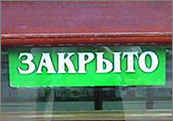| FR | About us | Home | User agreement | Link to us |
Adverbs of Time
Adverbs of time designate time when action was performed or duration of action. They answer the questions Когда? (When?), С каких пор? (Since when?), Как долго? (For how long?), Сколько времени? (How long?), Как часто? (How often?).
When answering the question Когда? the words утром (in the morning), вечером (in the evening), днём (afternoon), ночью (at night) are often used for time of the day. These adverbs are formed from nouns designating certain time of the day or night.
If you want to indicate exact time, use the preposition B + a numeral + the noun час (hour) + the genitive of a noun for time of the day. Here are some examples:
|
|
Note that утра is used for the period of time from 4 a.m. to noon, дня - from noon to 6 p.m., вечера - from 6 p.m. to midnight, ночи - from midnight to 4 a.m.
| Adjective | Time interval |
| утром | 4 a.m. to noon |
| днём | noon to 6 p.m. |
| вечером | 6 p.m. to midnight |
| ночью | midnight to 4 a.m. |
In order to indicate time of an action that repeats regularly, use the prefix еже + an adverb of time, as in:
|
|
You can also form indefinite adverbs of time with the help of the particles -то and -нибудь. These adverbs do not designate exact time, as in:
Когда-то она жила в Москве.
(She once lived in Moscow.)Когда-нибудь ваша мечта осуществится.
(Some day your dream will come true.)
The negative particles ни and не help form the adverbs никогда (never) and некогда (once). Compare them with the adverbs of place никуда and некуда.
The particle ни is used in personal sentences, while the particle не is used in impersonal sentences. For example:
Я
никогда
не был в Риме.
(I have never been to
Rome.)
Adverbs with
ни
are used in personal sentences.
Мне
некогда
участвовать в соревнованиях.
(I have no time to engage in a contest.)
Note that the verb участвовать is in
the infinitive,
because the sentence is impersonal.
Got questions?
Ask them in the Russian Questions and Answers — a place for students, teachers and native Russian speakers to discuss Russian grammar, vocabulary, pronunciation, and other aspects of the Russian language.
Copyright 2001-2026 MasterRussian.com | Privacy Policy | Contact Us
 Russian Lessons
Russian Lessons
- Russian alphabet
- Names of letters
- Russian Q&A new
- Pronunciation: Cons.
- Pronunciation: Vowels
- Noun Gender/Number
- Cases of Nouns
- Russian Greetings
- Personal Pronouns
- Learning Russian
- 1000 Common Words
- 500 Russian Verbs
- Top Russian Nouns
- » All lessons
- » Guest lessons
 Browse Topics
Browse Topics
- Start learning Russian
- Forum
- Bookstore
- Dictionaries
- Russian - basic
- Russian - adv
- Pronunciation
- Russian Blog new
- Reading
- Test & quizzes
- Translation
- Verbs
- Verb Conjugations
- Russian numbers
- Russian Tests new
- Vocabulary
- Writing
- Folk music
- Fun stuff
- Leo Tolstoy
- Learner's lore
- Literature
- Personal blogs
- Picture Dictionary new
- Proverbs
- Publications
- Radio & TV
- Russian culture
- Schools in Russia
- Russian Words
- Russian names
- Software
- Russian Words iPhone

Search MasterRussian

English » Russian dictionary

WORD OF THE DAY
![]() RSS
|
iGoogle
|
My Yahoo!
RSS
|
iGoogle
|
My Yahoo!
Meaning: to be able to, can, may
Pronunciation: [mohch']
Learn Russian words more... »
TODAY'S STREET SIGN

Russian: Закрыто
English: Closed
FOLLOW US ON TWITTER

MasterRussian on Twitter


